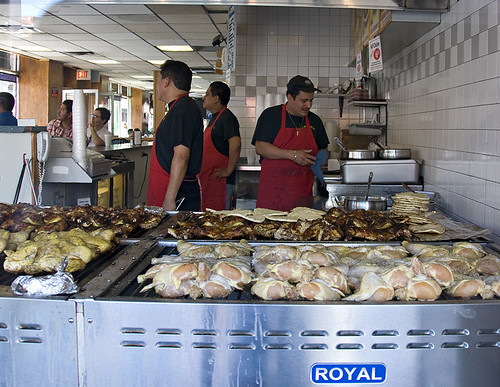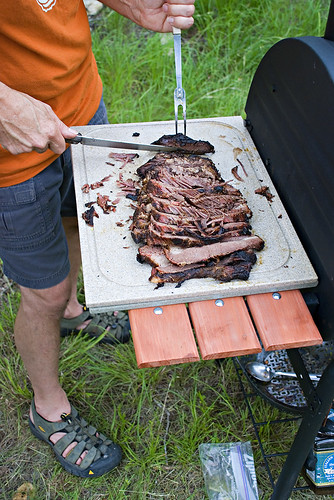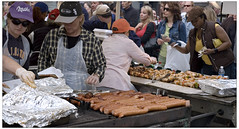If I couldn't grill vegetables and fish, why, I wouldn't know what to do on my porch (seeing as my porch is only big enough for a grill and one chair). Seriously, summertime means grilled food (including an occasional marinated chicken or steak) - did I really need another food warning to destroy my enjoyment of slightly charred zukes or asparigi?
Cutting Cancer Risk When Grilling:
To grill or not to grill? That's the question many consumers are asking amid reports that one of America's most popular cooking methods is linked with a higher risk for cancer.While it's true that grilled and charred meats can be risky, you don't have to shut down your grill. Simple cooking and preparation strategies and even the side dishes you serve can dramatically lower and even eliminate the risks associated with grilling.
...
Grilling creates two risky types of chemical reactions. The first occurs when fat drips on the coals, forming carcinogenic polycyclic aromatic hydrocarbons, or PAHs. The best way to prevent this is to avoid flaming or charring food. If it happens, scrape off the black stuff.A bigger concern may be the chemical reaction that happens inside meats, chicken and fish grilled at high temperatures and for long periods. Compounds in these foods react at high temperatures to create heterocyclic amines, or HCAs. In laboratory studies, HCAs trigger breast, colon and prostate tumors in rats and mice. About 30 epidemiological studies have shown a link between high consumption of grilled or well-done foods and cancer, says James Felton, senior biomedical scientist at the Lawrence Livermore National Laboratory in Livermore, Calif.
There are some options that may reduce the amount of harmful byproducts, namely:
Microwave foods for about a minute before grilling. Precooking means the food cooks faster on the grill and isn't exposed to high temperatures as long. More important, the amino acids and creatine come out in the microwave, so no chemical reaction takes place once the food is on the grill. A well-done hamburger microwaved for a minute first has about one-tenth the HCAs of a burger cooked entirely on the grill, says Dr. Felton.Eat lots of veggies with your grilled foods. Grilled veggies give you the great grilled flavor but don't produce the cancer-causing chemicals triggered in meat grilling. (You still need to scrape off the black stuff.) And studies show that eating cruciferous vegetables like broccoli as a side dish to grilled meats changes the way the body metabolizes the chemicals created in grilling.
Use marinades. Marinating foods sets up a barrier against heat that lowers the creation of HCAs. Use a marinade with less oil, so less fat drips into the coals.
Flip your food often. This lowers the temperature, lessening the chance of the risky chemical reaction triggered by high temperatures.
Cook red meat medium or rare. The biggest health risk comes when meat is cooked well done.
Finally, it's important to note that the risk comes mostly from cooking at high temperatures, whether its from your oven, frying pan or backyard grill. When cooking indoors, Dr. Felton suggests cooking meats at 350 degrees or lower or using a slow cooker.
Maybe I'm just hungry.
Technorati Tags: Food & Drink, health, science



